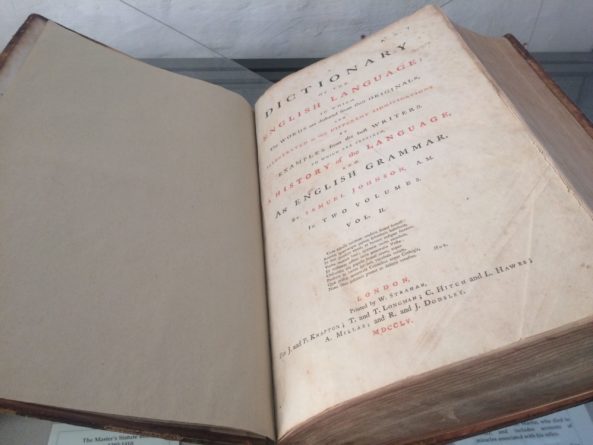‘Perseverence’ has recently been announced as the Cambridge Dictionary’s Word of the Year for 2021. It is defined as “continued effort to do or achieve something, even when this is difficult or takes a long time”. This captures the spirit of people across the world to never give up, despite the challenges and disruption of the pandemic. It might also have been the word of the year chosen by Samuel Johnson (1709-1784) in 1755 to define the mammoth task of compiling his famous Dictionary of the English Language [1].
We are fortunate that we have the first edition of Johnson’s remarkable dictionary at Trinity Hall. The College was unusually prosperous in the mid to latter part of the 18th century and this was a period when most of the books in the library were purchased rather than bequested.

Title page of Johnson’s Dictionary
Johnson certainly needed perseverance to complete his dictionary. It was to take him nearly nine years to complete – over five years longer than he had anticipated. However, compared to the first French dictionary completed in 1694, which took a team of 40 people a total of 55 years to complete, this was remarkably speedy.
Johnson was first approached by a group of booksellers and publishers to create the dictionary in 1746. They hoped that it would standardise the spelling and use of the English language. However, in his book’s preface, Johnson explains how he had found the language to be ‘copious without order, and energetick without rules’. As well as the difficulties of the English language itself, Johnson compiled his dictionary almost single-handedly (he had no more than four helpers at a time). In addition to these practicalities, he was mourning the loss of Tetty, his wife of 17 years, who had died in 1752.
The Dictionary, first published on 15 April 1755 in two large volumes, contains the definitions for 42,773 words. Johnson himself pronounced the book “proud in its great bulk”. It was not the first English dictionary, but could be considered the most significant and extensive of its time. One of Johnson’s important innovations was to include literary quotations, most frequently by Shakespeare, Milton and Dryden, to illustrate the meanings and context of the words. Johnson’s definition of ‘Perseverance’ for example, contains quotes from various literary sources:
Perseve’rance: Persistence in any design or attempt; steadiness in pursuits; constancy in progress. It is applied alike to good and ill.
![PERSEVE'RANCE. n.s. [perseverance, Fr. perseverantia, Lat. This word was once improperly accented on the second syllable.] Persistence in any design or attempt; steadiness in pursuits; constancy in progress. It is applied alike to good and ill. The king becoming graces, Bounty, persev’rance, mercy, lowliness; I have no relish of them. Shakesp. Macbeth. Perseverance keeps honour bright: To have done, is to hang quite out of fashion, Like rusty mail in monumental mockery. Shakespeare. They hate repentance more than perseverance in a fault. King Charles. Wait the seasons of providence with patience and perseverance in the duties of our calling, what difficulties soever we may encounter. L’Estrange. Patience and perseverance overcome the greatest difficulties. Clarissa. And perseverance with his batter’d shield. Brooke.](https://www.trinhall.cam.ac.uk/wp-content/uploads/2023/08/IMG_2942.jpg)
Definition of perseverance from Johnson’s Dictionary (1755)
Despite the drudgery and difficulties involved we can be thankful that Johnson persevered with his task as his dictionary is a treasure trove of anachronistic words. Three of my favourites are:
“Hotcockles: A play [game] in which one covers his eyes, and guesses who strikes him.”
“Jiggumbob: A trinket; a knick-knack; a slight contrivance in machinery.”
“Fopdoodle: A fool; an insignificant wretch.”
There is also much to enjoy in Johnson’s witty and humorous definitions:
“Patron: One who countenances, supports or protects. Commonly a wretch who supports with insolence, and is paid with flattery.”
“Politician: A man of artifice; one of deep contrivance.”
The dictionary was sold for the extravagant price of 4 pounds, 10 shillings – roughly the equivalent of £350 today. In Johnson’s lifetime five further editions were published, with a sixth edition published a year after his death in 1785. Although he was paid a large sum of money in advance, most of this was eaten up by the time the dictionary was published, so it gave him fame, but unfortunately did not make his fortune.
Image: Engraving of Samuel Johnson from Boswell’s Life of Samuel Johnson (1884)
References
[1] Johnson, Samuel. A Dictionary of the English Language : In Which the Words Are Deduced from Their Originals, and Illustrated in Their Different Significations by Examples from the Best Writers. To Which Are Prefixed, a History of the Language, and an English Grammar. London: Printed by W. Strahan, for J. and P. Knapton; T. and T. Longman; C. Hitch and L. Hawes; A. Millar; and R. and J. Dodsley, 1755.
Further reading
Johnson’s Dictionary Online https://johnsonsdictionaryonline.com
Reddick, Allen Hilliard. The Making of Johnson’s Dictionary, 1746-1773. Rev. ed. Cambridge: Cambridge UP, 1996.